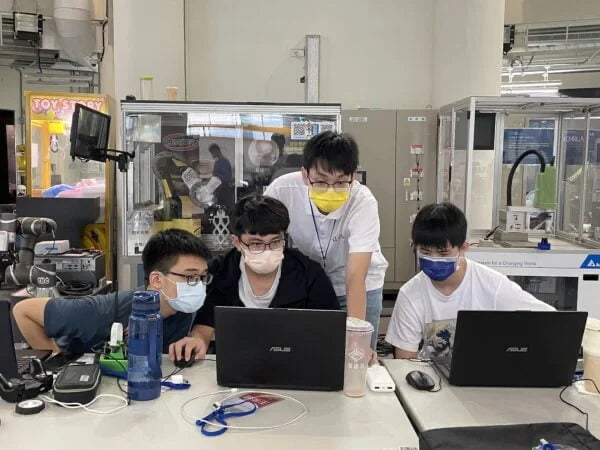NVIDIA Jetson Nano Enables High School Students to Build AI Self-Driving Cars Hands-On!
- service50558
- Nov 21, 2023
- 4 min read
Updated: Nov 22, 2023
AI Self-Driving Car Racing Competition Attracts High School Students from North, Central, and South
In collaboration with the brand AI4kids, a summer event was held at the Robotics Maker Base in the Central Taiwan Science Park. Utilizing NVIDIA Jetson Nano edge computing, a four-day AI self-driving car practical competition was designed, drawing participants from Taipei, New Taipei, Hsinchu, Taichung, Yunlin, Kaohsiung, and Penghu. Guided by professional instructors and the AI4kids teaching team, students progressed from foundational machine learning and deep learning knowledge to hands-on experience with JetBot car hardware assembly, motion control (basic programming, remote control), intelligent control (obstacle avoidance, object tracking), and finally, independent training of AI visual recognition models. The event concluded with a Jetbot self-driving car race!
How to Equip the Racing Car with AI Vision?
The self-driving car race track is a square circuit, and the challenge for the students is to enable the car to complete a lap in the shortest time possible using computer vision without any manual remote control or programming. In the process, teams of two first had to complete track image collection, AI model training, and refinement. They underwent multiple testing and verification phases with parameter adjustments. Many students were trying to train their own AI model for the first time, encountering challenges such as reflections on the track during image capture, uneven road surfaces, and parameter setting errors leading to unstable car control. Multiple adjustments were necessary to successfully make the car complete a lap, and students who spent half a day on training exclaimed, "Time is tight!"
"We need to repeatedly collect samples, gather images from various angles, and plan for various movements. We took more than 200 pictures for learning and repeated the training 50 times. During training, we utilized the built-in GPU of Jetson. In the end, we achieved the car's movement. The final presentation involves four closely connected data points: 'overall speed,' 'turning acceleration,' 'track trajectory differentiation processing,' and 'balance of left and right motors.' Integrating 'environment,' 'venue,' 'data,' and 'four major variables,' completing a simple track is really not easy!" — Chen, a student from Zhengxin High School
Competition Champion - "Realized It Wasn't as Easy as Imagined!"
"Our team's Jetbot encountered some problems, so we started testing a bit later. We faced many issues during the production, such as being unable to connect to the computer or finding the robot on the computer. In the afternoon, while operating the robot and capturing photos for training the model, we encountered consecutive issues where the program couldn't proceed or errors occurred. Additionally, the robot unexpectedly ran out of power. The only solution was for us to slowly identify the causes of the problems and troubleshoot the errors. We also had to find the corresponding charger to recharge the robot." — Wu, a student from Xinmin High School
Jetbot Self-driving Car Video Recordings
Not only practical courses but also comprehensive foundational knowledge!
On the first day of the four-day camp, participants were introduced to the field of artificial intelligence, covering topics such as neural networks, machine learning, the Internet of Things, and the Python programming language. The second day advanced the understanding of the robotic world, including embedded single-board computers (Jetson Family), robot brains, and visual installations (OS & Camera), deep learning (NVIDIA Jetson-inference), and computer vision applications (detection, recognition, segmentation).
"On the second day, we used ThinkerCAD to simulate Arduino. In the afternoon, we introduced edge devices and the application and architecture of Jetson in daily life. Next, we experienced a robotic arm competition, where we used a robotic arm to pick up yellow rubber ducks, and the one who picked up the most was the winner. After that, we assembled the JetBot together. Fortunately, the distribution inside wasn't too difficult, and I could understand it by reviewing a bit. During the course, I learned about some Arduino components and gained theoretical knowledge. Although I had encountered some of the topics in school, it was still interesting to listen to." — Wei, a student from Mingdao High School
Learning Portfolio, Providing Comprehensive Feedback on the Learning Process and Achievements!
At the end of each day's sessions, the camp allocated ten minutes for participants to review the key points of the day's lessons, reflect on the absorbed knowledge, and write a learning portfolio, creating a comprehensive record of their learning process. In addition, the camp provided hands-on guidance to help each participant obtain the international certification "Getting Started with AI on Jetson" from NVIDIA, enriching their four-day learning journey!
Four-Day Camp, Broadening the Horizon of High School Students in AI!
The four days of courses truly brought many different experiences and intellectual stimulations to each student. Opening the door to the field of AI robotics and autonomous vehicles for the participants, the camp also hopes that each student will explore more deeply in the future and create more applications related to autonomous vehicles!
"Four days ago, I had never encountered robots or Jetbot, but with the help of the teaching assistants and teachers, I successfully completed the tasks. It was very fulfilling, and I learned a lot of knowledge that I didn't understand before. I also had the hands-on experience of assembling Jetbot, which was unprecedented for me. If I have the opportunity to work on this again in the future, it should spark my interest." ——Nanhu High School, Hong Student












Comments